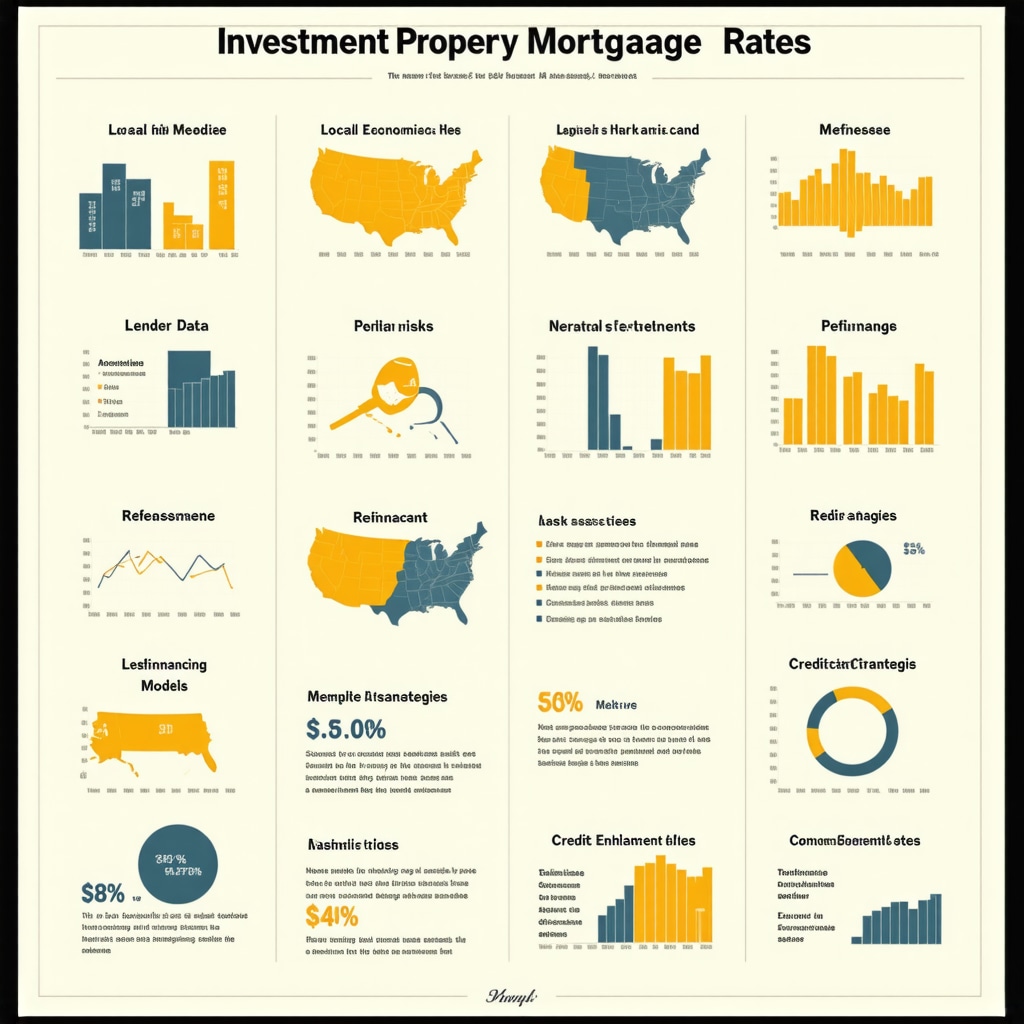Cracking the Code: How Tennessee’s Market Shapes Investment Property Mortgage Rates
Investing in Tennessee’s real estate market offers lucrative opportunities, but securing the best mortgage rates for investment properties can be a complex puzzle. Unlike primary residences, investment property mortgages often come with higher interest rates and stricter lending criteria, influenced by local economic trends, property demand, and borrower profiles. Understanding these nuances is crucial for investors aiming to maximize returns while minimizing financing costs.
Strategic Pathways: Navigating Loan Options Tailored for Tennessee Investors
Tennessee investors can explore a variety of mortgage products, from conventional loans to specialized jumbo loans tailored for high-value properties. Conventional investment property loans typically require a larger down payment—often 20% or more—and carry interest rates that reflect the lender’s risk assessment of rental properties. For example, in Nashville’s booming rental market, lenders might offer competitive rates due to strong demand, whereas in less populated areas, rates might skew higher.
Jumbo loans, designed for properties exceeding conforming loan limits, are another avenue but often come with nuanced rate structures and underwriting requirements. Knowing how to compare these top loan options effectively can make a tangible difference in your mortgage costs. For a detailed breakdown of these loan types, see the comprehensive guide to investment property mortgages in Tennessee.
Insider Insight: What Factors Influence Your Mortgage Rate Beyond the Basics?
While credit score and down payment size are widely known factors, Tennessee-specific elements such as local property tax rates, rental market stability, and lender competition in metropolitan hubs like Memphis and Knoxville also weigh heavily. For instance, lenders factor in the comparative rental income potential of a property when pricing risk, which can affect your interest rate and loan terms.
How Can Investors Leverage Tennessee’s Mortgage Brokers to Secure Better Rates?
Mortgage brokers in Tennessee act as vital intermediaries, connecting borrowers to a wide spectrum of lenders and loan products. Their expertise in local market trends and lender nuances often translates into access to exclusive rates and tailored financing solutions not readily available to the average borrower. Investors who engage knowledgeable brokers can benefit from personalized rate shopping and negotiation strategies that align with their investment goals.
Choosing the right mortgage broker versus a direct lender depends on your investment strategy, credit profile, and timeline. For a detailed comparison that helps investors make this decision, check out mortgage broker vs lender in Tennessee: choosing the right partner.
Proactive Measures: How to Lock in Competitive Rates in a Fluctuating Market
Mortgage rates are subject to change based on economic indicators and local market shifts. Investors can capitalize on timing strategies, such as locking in rates during dips or leveraging refinancing opportunities to lower costs over time. Staying informed on Tennessee’s mortgage rate trends—especially for investment properties—enables smarter financial decisions. Resources like how to lock in a mortgage rate in Tennessee before it rises provide actionable tips tailored for this dynamic environment.
Integrating these insights with a solid understanding of your credit impact—as detailed in how credit scores shape your mortgage interest rates today—can empower investors to secure the most favorable financing possible.
Have you recently navigated investment property mortgages in Tennessee? Share your experiences or questions below to help build a community of informed investors.
For authoritative data on mortgage trends and economic factors affecting Tennessee, the Federal Reserve’s monetary policy resources offer invaluable insights that underpin market movements and interest rate fluctuations.
Beyond Numbers: Personal Lessons on Tennessee Investment Mortgages
Reflecting on my journey investing in Tennessee real estate, I realized that securing favorable mortgage rates for investment properties requires more than just crunching numbers. It’s about understanding the local nuances, building relationships with lenders or brokers, and staying agile as market conditions shift. For example, when I was evaluating a duplex in Memphis, I learned firsthand how the neighborhood’s rental demand influenced the lender’s risk assessment and ultimately my interest rate.
In my experience, having a mortgage broker who knows the Tennessee market intimately can be a game-changer. They helped me navigate rate options that weren’t initially visible through direct lender channels. This tailored approach aligned well with my investment goals and timeline, making the financing process smoother and more cost-effective. If you’re exploring this route, it’s worth reading more about choosing between mortgage brokers and lenders in Tennessee.
When Is the Best Time to Lock in Your Mortgage Rate for Investment Properties?
This question haunted me early on. Rates can swing due to national economic policies or local market shifts, and locking in too soon or too late can impact your long-term returns significantly. The Federal Reserve’s monetary policy, for instance, often signals rate movements ahead of time. According to their official resources, watching interest rate announcements and economic indicators can guide timing decisions.
I found that combining this macroeconomic awareness with local insights—like current inventory levels or rental demand in Tennessee cities—helps create a balanced strategy. Sometimes, locking in a rate during a slight dip, even if it doesn’t look like the absolute lowest, can be a smart move to avoid potential hikes during lengthy loan approvals.
Practical Tips for Managing Your Mortgage Strategy in Tennessee’s Dynamic Market
One practical takeaway from my experience is to maintain flexibility. Refinancing can be a valuable tool if rates drop after you lock in, but it’s essential to weigh the costs and timing carefully. Tennessee investors should keep a close eye on refinancing trends and options, such as those detailed in refinancing strategies in Tennessee, to optimize savings.
Also, credit scores play a pivotal role in securing the best rates. I focused on improving mine before applying, which paid off with lower interest costs over the life of the loan—a strategy you can explore further in how credit scores impact Tennessee mortgage rates.
Have you had experiences financing investment properties in Tennessee? What strategies or challenges stood out for you? Feel free to share your stories or questions in the comments below; building a community of informed investors benefits us all.
Deep Dive into Risk Assessment: How Lenders Quantify Tennessee Investment Property Risk
Beyond conventional metrics like credit score and loan-to-value ratio, Tennessee lenders employ a sophisticated risk assessment model that incorporates macroeconomic indicators and hyperlocal data analytics. They analyze neighborhood-level rental vacancy rates, historical property appreciation trends, and even municipal development plans. For example, emerging areas around Chattanooga undergoing infrastructural upgrades often attract lenders who adjust rates favorably due to anticipated rental demand escalation.
Moreover, lenders integrate borrower-specific data such as debt service coverage ratios (DSCR) and cash flow projections, especially for multi-family units. This rigorous underwriting process means that investors who provide transparent, detailed financials and demonstrate strong portfolio diversification often negotiate better mortgage terms.
How Can Investors Use Data-Driven Insights to Influence Mortgage Rate Negotiations?
Savvy Tennessee investors leverage detailed market intelligence reports, often sourced from platforms like CoStar and local MLS databases, to present compelling cases to lenders. They illustrate projected rental income growth, low tenant turnover rates, and neighborhood revitalization efforts, which collectively reduce perceived lending risk.
In practice, this means preparing comprehensive investment packages that go beyond the standard loan application—incorporating demographic trends, comparable rental yields, and vacancy forecasts. Presenting this data proactively can shift the lender’s risk calculus, resulting in more competitive interest rates or flexible loan covenants.
For a granular look at how to assemble these data-backed presentations, investors can explore resources such as the Investopedia guide on investment property mortgages.
Unpacking the Impact of Federal Reserve Policies on Tennessee’s Investment Mortgage Landscape
The Federal Reserve’s monetary policy decisions ripple through the Tennessee real estate market, influencing mortgage rates in nuanced ways. While the Fed sets the federal funds rate, mortgage rates are more directly tied to the yield on 10-year Treasury notes, which fluctuate based on investor expectations of inflation and economic growth.
During periods of quantitative easing or tightening, these yields—and consequently mortgage rates—can swing substantially. Tennessee investors monitoring these indicators can time loan lock-ins or refinancing moves more strategically. Additionally, local economic conditions, such as employment growth in key metropolitan areas like Nashville and Memphis, modulate how quickly these national changes translate into local lending rates.
For detailed economic data and forecasts, the Bureau of Labor Statistics Midwestern Region: Tennessee provides authoritative employment and economic metrics vital for investment decision-making.
Leveraging Advanced Refinancing Techniques to Optimize Long-Term Investment Returns
Refinancing is more than a reactive strategy; it can be a proactive tool for Tennessee investors aiming to enhance cash flow and build equity faster. Techniques such as cash-out refinancing enable investors to tap into accumulated property equity to fund additional acquisitions or renovations that increase property value.
Moreover, strategic refinancing when interest rates dip can reduce monthly payments or shorten loan terms, accelerating portfolio growth. However, sophisticated investors must carefully analyze break-even points, considering closing costs and potential tax implications, which vary under Tennessee’s state laws.
Engaging with mortgage professionals versed in investment property refinancing nuances, or utilizing calculators tailored for investment scenarios, can uncover savings that less-informed investors might miss. Detailed refinancing frameworks are discussed in refinancing strategies in Tennessee.
What Are the Advanced Credit Enhancement Techniques That Can Secure Better Mortgage Rates for Tennessee Investors?
Beyond improving credit scores, investors can employ credit enhancement techniques such as securing co-signers with strong credit profiles, establishing dedicated investment accounts to demonstrate liquidity, or deploying reserve funds as additional collateral. These methods can substantially mitigate lender risk concerns, translating into more favorable interest rates.
Additionally, maintaining a diversified investment portfolio across different asset classes can signal financial stability, indirectly influencing lender confidence. Investors often consult credit counselors or financial advisors to implement these sophisticated strategies tailored to Tennessee’s lending environment.
Understanding and applying these credit enhancement tactics require a high level of financial literacy and access to expert guidance, underscoring the value of working with experienced mortgage brokers and financial planners.
Ready to elevate your Tennessee investment property mortgage strategy? Explore our expert-curated resources and connect with seasoned mortgage professionals to unlock tailored financing solutions that align with your ambitious investment goals.

Decoding the Intersection of Macro Trends and Local Market Forces
In the labyrinth of Tennessee’s investment property financing, the interplay between national economic policies and hyperlocal market conditions is pivotal. While Federal Reserve actions set the stage for overall interest rate trajectories, nuanced local variables—such as municipal development initiatives, zoning changes, and demographic shifts—can uniquely influence lender appetites and mortgage pricing within Tennessee’s diverse counties.
For example, emerging micro-markets within cities like Chattanooga or Knoxville may experience differential rate adjustments reflecting anticipated growth or risk, underscoring the necessity for investors to integrate both macroeconomic and granular data into their mortgage strategy.
What Advanced Financial Instruments Are Available to Tennessee Investors to Mitigate Interest Rate Volatility?
Investors increasingly turn to sophisticated hedging mechanisms, including interest rate swaps, cap agreements, and adjustable-rate mortgage (ARM) products with tailored reset periods, to manage exposure to fluctuating rates. These instruments, while more common among institutional investors, are becoming accessible to experienced individual investors seeking to stabilize financing costs over the investment horizon.
Implementing such strategies requires collaboration with lenders and financial advisors who specialize in investment property financing, ensuring products align with portfolio objectives and risk tolerance parameters. Detailed insights into structured financing options can be found in resources such as the Mortgage Bankers Association, which provides comprehensive analysis on mortgage derivatives and risk management tools.
Harnessing Data Analytics to Predict Market Movements and Optimize Loan Timing
Cutting-edge investors leverage advanced analytics platforms that amalgamate real estate transaction data, economic indicators, and consumer sentiment indexes to forecast mortgage rate shifts and property value trends. Machine learning models and AI-powered tools enable predictive insights, allowing Tennessee investors to time loan lock-ins and refinancing moves with greater precision.
By utilizing these technologies, investors can identify subtle market inflections that traditional analysis might overlook, thereby gaining a competitive edge in financing negotiations and portfolio expansion planning.
Integrating Environmental, Social, and Governance (ESG) Factors into Mortgage Negotiations
As sustainability considerations gain traction, lenders increasingly assess ESG metrics when underwriting investment properties. Tennessee investors who prioritize energy efficiency upgrades, community engagement, and sustainable development practices may access preferential mortgage terms or green financing incentives.
Adopting an ESG-focused approach not only aligns with emerging regulatory trends but also enhances asset appeal and long-term value, creating a virtuous cycle that benefits both investors and lenders.
How Can Tennessee Investors Demonstrate ESG Compliance to Unlock Favorable Financing?
Documenting energy audits, sustainability certifications (such as LEED or ENERGY STAR), and community impact initiatives forms the backbone of presenting a compelling ESG profile. Collaborating with specialized mortgage brokers knowledgeable about green financing programs can facilitate the identification and application for these advantageous loan products.
Additional guidance is available through the U.S. Green Building Council, which offers resources on certification processes and market trends related to sustainable real estate investments.
Elevate your Tennessee investment property financing strategy by embracing these advanced methodologies and market insights. Connect with our network of seasoned mortgage professionals and data analytics experts to tailor solutions that propel your portfolio to new heights.

Frequently Asked Questions (FAQ)
What distinguishes investment property mortgage rates from primary residence rates in Tennessee?
Investment property mortgages typically carry higher interest rates and stricter qualification criteria compared to primary residences due to increased lender risk. Factors such as higher down payment requirements (often 20%+), rental market volatility, and borrower financial strength influence these rates.
How does local Tennessee market demand affect my mortgage rate?
Lenders assess local rental demand and property appreciation trends to price risk. In high-demand markets like Nashville or Chattanooga, competitive rental demand can lead to more favorable mortgage rates, while areas with uncertain rental income or higher vacancy rates may incur higher rates.
Can using a mortgage broker in Tennessee really save me money on investment property loans?
Yes. Mortgage brokers have access to a wide lender network and can negotiate tailored financing solutions. Their deep understanding of Tennessee’s local market dynamics allows them to identify exclusive rates or loan products that direct lenders might not offer, potentially reducing your overall borrowing costs.
What role does my credit score play in securing competitive investment mortgage rates in Tennessee?
Your credit score is a critical factor; higher scores generally yield lower interest rates. For investment properties, lenders often require stronger credit profiles than for primary residences. Improving your credit before applying can significantly impact your mortgage costs.
When is the optimal time to lock in a mortgage rate for Tennessee investment properties?
Optimal timing involves monitoring both national economic indicators, such as Federal Reserve announcements and Treasury yields, and local market conditions like rental demand and inventory. Locking in during rate dips or before anticipated hikes can safeguard against rising costs. However, balancing timing with loan approval duration is essential.
How can refinancing strategies benefit my Tennessee investment property portfolio?
Refinancing when rates drop can reduce monthly payments, shorten loan terms, or free up equity via cash-out refinancing for further investments. Strategic refinancing requires analyzing break-even points, closing costs, and tax implications to maximize long-term portfolio growth.
What advanced financial tools exist to hedge against mortgage rate volatility?
Experienced investors may use interest rate swaps, rate caps, or adjustable-rate mortgages with customized reset periods to manage exposure. These instruments help stabilize financing costs but require sophisticated understanding and professional guidance.
How do ESG factors influence mortgage lending for Tennessee investment properties?
Lenders increasingly consider Environmental, Social, and Governance (ESG) performance. Properties with energy efficiency certifications or sustainable community impact may qualify for preferential loan terms or green financing incentives, aligning financial benefits with responsible investment practices.
What information should I prepare to negotiate better mortgage rates with Tennessee lenders?
Comprehensive data presentations including local rental income projections, vacancy rates, neighborhood development plans, and borrower financial strength (e.g., debt service coverage ratios) can reduce perceived risk and improve loan terms. Leveraging market intelligence platforms enhances your negotiation position.
Are there credit enhancement strategies beyond improving credit scores to secure better mortgage terms?
Yes. Tactics include securing strong co-signers, demonstrating liquidity through dedicated investment accounts, maintaining reserve funds as collateral, and building a diversified investment portfolio. These strategies can alleviate lender risk concerns and improve interest rates.
Trusted External Sources
- Federal Reserve Monetary Policy Resources – Provides authoritative insights into national economic policies affecting interest rates, helping investors anticipate market shifts impacting Tennessee mortgage rates.
- Bureau of Labor Statistics (Midwestern Region: Tennessee) – Offers detailed employment and economic data essential for understanding local market conditions influencing real estate demand and lender risk assessments.
- Mortgage Bankers Association (MBA) – A leading industry body offering in-depth analysis on mortgage products, derivatives, and risk management tools relevant to advanced financing strategies.
- U.S. Green Building Council (USGBC) – A key resource on sustainability certifications and green financing opportunities that increasingly affect mortgage lending decisions.
- Investopedia Investment Property Mortgage Guides – Provides comprehensive, expert-reviewed explanations of investment property financing mechanics and negotiation techniques.
Conclusion
Securing optimal mortgage rates for investment properties in Tennessee demands a nuanced understanding of both macroeconomic forces and local market intricacies. Key concepts include recognizing how regional rental demand, credit quality, and lender risk models shape interest rates, alongside leveraging professional mortgage brokers and advanced financial tools. Staying informed on Federal Reserve policies, refinancing opportunities, and emerging ESG trends empowers investors to strategically time rate locks and negotiate favorable terms.
Integrating data-driven insights with proactive credit enhancement and sustainability initiatives positions Tennessee investors to maximize financing efficiency and portfolio growth. We encourage you to apply these expert strategies, share your experiences, and explore further detailed resources to elevate your investment property financing outcomes in Tennessee’s dynamic real estate landscape.

